Supreme Court

Five years ago, the Supreme Court ruled in Citizens United v. Federal Election Commission that corporations are welcome to the same free speech rights that are allotted to individuals and can therefore spend freely on direct political advocacy.
To those unfamiliar with the topic, Citizens United essentially opened the flood gates for dark money to flow into the Washington electoral circuit. Within the five years since this decision the amount of money spent on political campaigns has steadily increased each election cycle. The most recent midterm elections cost $3.7 billion dollars.
Why should this matter to Christians?
1. Divine dignity is silenced.
The Center for Responsive Politics reported that only “666,773 individuals donated more than $200 to campaigns in the 2014 election cycle." What does this mean? Only 0.2 percent of the population funded the elections. Only the wealthiest Americans, through Super PAC funding and private corporation contributions have influence over the electoral state. The voice of the average American is almost completely silenced because they do not have financial influence. This becomes an issue of morality when we see each citizen as an individual with divine dignity. When the voice of the individual is silenced, the voice of the Divine is also silenced because only the economically elite are heard.

The Supreme Court on Jan. 12 considered a tiny church’s curbside sign in a case that could raise the bar on government regulation of speech, and make it easier for houses of worship to advertise their services.
The Alliance Defending Freedom, the nonprofit advocacy group that represents Pastor Clyde Reed and his Good News Community Church, bills the case, Reed v. Town of Gilbert, as a religious rights case. But their attorney mostly argued it on free speech grounds.
“The town code discriminates on its face by treating certain signs differently based solely on what they said,” attorney David A. Cortman told the justices. “The treatment we’re seeking is merely equal treatment under the First Amendment.”
The town of Gilbert, Ariz., outside Phoenix, allows political signs to be much larger and permits them to stay up much longer, Cortman said.
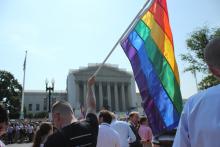
Ten years after Massachusetts became the first state to allow same-sex marriage, gay and lesbian Americans can be wed in 35 states and the District of Columbia (Florida will boost that number to 36, starting Jan. 6). This year, the Supreme Court may put an end to the skirmish by legalizing what progressives call “equality” and conservatives dub a “redefinition” of this cherished social institution.
The court last ruled on gay marriage in 2013 when the justices gutted much of the federal Defense of Marriage Act in United States v. Windsor and delivered a massive blow to anti-gay marriage advocates. Since then, the court has acted by not acting — in effect, doubling the number of states where gay marriage is legal, from 17 to 35, by refusing to hear a slew of appeals last year.
In November, the Cincinnati-based 6th U.S. Circuit Court of Appeals upheld gay marriage bans in four states, which will almost certainly require the high court to decide the issue once and for all.
Conservative Christians have been among the most ardent opponents of gay marriage and rights for decades. How will they respond if the Supreme Court makes gay marriage legal nationwide?
The answer, it turns out, depends on which Christian you’re speaking to.
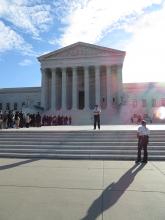
The Supreme Court — the last stop for condemned prisoners such as Scott Panetti, a Texan who is mentally ill — and whose case was just stayed by an appellate court — appears increasingly wary of the death penalty.
In May, the justices blocked the execution of a Missouri murderer because his medical condition made it likely that he would suffer from a controversial lethal injection.
Later that month, the court ruled 5-4 that Florida must apply a margin of error to IQ tests, thereby making it harder for states to execute those with borderline intellectual disabilities.
In September, a tipping point on lethal injections was nearly reached when four of the nine justices sought to halt a Missouri prisoner’s execution because of the state’s use of a drug that had resulted in botched executions elsewhere.
And in October, the court stopped the execution of yet another Missouri man over concerns that his lawyers were ineffective and had missed a deadline for an appeal. The justices are deciding whether to hear that case in full.

The same-sex marriage movement lost its first major case in a federal appeals court Thursday after a lengthy string of victories, creating a split among the nation’s circuit courts that virtually guarantees review by the U.S. Supreme Court.
The 2-1 ruling from the Cincinnati-based 6th U.S. Circuit Court of Appeals reversed lower court rulings that had struck down gay marriage bans in Michigan, Ohio, Kentucky and Tennessee.
More important, it gives Supreme Court justices an appellate ruling that runs counter to four others from the 4th, 7th, 9th and 10th circuits. Those rulings struck down same-sex marriage bans in Virginia, Indiana, Wisconsin, Oklahoma, Utah, Idaho and Nevada, leading to similar action in neighboring states.
Circuit Judge Jeffrey Sutton, one of the Republican Party’s most esteemed legal thinkers and writers, issued the 42-page decision precisely three months after hearing oral arguments in the cases, with fellow GOP nominee Deborah Cook concurring. He delivered a rare defeat for proponents of same-sex marriage, who had won nearly all the cases decided from Florida to Alaska since the Supreme Court ruled against the federal Defense of Marriage Act in June 2013.
Sutton argued that appellate judges’ hands are tied by a one-sentence Supreme Court ruling from 1972, which “upheld the
right of the people of a state to define marriage as they see it.” Last year’s high court decision requiring the federal government to recognize legal same-sex marriages does not negate the earlier ruling as it applies to states where gay marriage is not legal, he said.

In some ways, the case of the Muslim prisoner who wants to grow a beard seems easy. When it comes to a prisoner’s religious rights, federal laws favors accommodation when possible.
So how could Gregory Holt — known as Abdul Maalik Muhammad after his conversion to Islam — possibly lose at the Supreme Court, where the justices heard his case on Oct. 7?
Holt wants to grow a mere half-inch beard — a length of whisker allowed in the vast majority of state prison systems, but not the one where he is incarcerated: Arkansas.
Even Chief Justice John Roberts wondered how such a seemingly straightforward case came before the high court, which usually occupies itself with the thorniest of legal questions.

The Supreme Court’s decision to sit out the legal battle over same-sex marriage will — for now, at least — leave the future of laws prohibiting gays and lesbians from marrying in the hands of lower state and federal court judges. But it also almost certainly means the couples challenging those laws are more likely to win in the end.
The court said Oct. 6 that it would not hear appeals from five states whose same-sex marriage bans had been invalidated by lower federal courts. The decision, issued without explanation, will likely lead to recognition of gay marriages in 11 more states. It also allows an avalanche of legal challenges to the remaining bans to keep going forward in state and federal courts, where gay and lesbian couples have overwhelmingly prevailed.
The court’s decision leaves unchanged 20 state laws blocking same-sex unions. Each is already under legal attack, facing challenges in state or federal court, and sometimes both. Challenges to marriage bans already have reached a handful of state appeals courts and the federal appeals courts for the 5th, 6th, 9th and 11th circuits.
Some of those judges had been waiting to see what the Supreme Court would do. The court’s instruction Oct 6. was: Proceed.
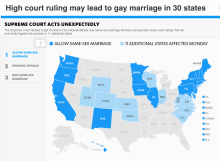
On Monday, the Supreme Court declined to hear several cases where federal appeals courts upheld the Constitutional rights of same-sex couples to marry, causing a seismic, if quiet, shift in several states' debates over same-sex marriage. The decision to not hear cases leaves intact lower appeals rulings that had overturned same-sex marriage bans. For five states and potentially six more, this guarantees the legal right for same-sex couples to marry.
USA Today reports:
The unexpected decision by the justices, announced without further explanation, immediately affects five states in which federal appeals courts had struck down bans against gay marriage: Virginia, Indiana, Wisconsin, Oklahoma and Utah.
It also will bring along six other states located in the judicial circuits overseen by those appellate courts: North Carolina, South Carolina, West Virginia, Colorado, Kansas and Wyoming. Lower court judges in those states must abide by their appeals court rulings.
Read more here.
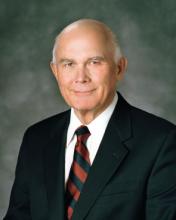
If Mormon opposition to same-sex marriage does not prevail in the United States, Mormons should respond graciously and “practice civility with our adversaries,” a leading church apostle counseled Oct. 4 at the faith’s General Conference.
“We should be persons of goodwill toward all,” said declined to hear appeals from five states, including Utah, in which federal appeals courts had struck down bans against gay marriage. Within hours, clerks across Utah, Virginia, Indiana, Wisconsin and Oklahoma began issuing marriage certificates to gay and lesbian couples.
Oaks, who has been outspoken in defending Mormons’ stance against gay marriage, said those in the 15 million-member Church of Jesus Christ of Latter-day Saints should be exemplars of civility.
“We should love all people, be good listeners, and show concern for their sincere beliefs,” he said during the afternoon session of the 184th Semiannual LDS General Conference, a two-day meeting broadcast across the world via satellite, TV or the Internet. “Though we may disagree, we should not be disagreeable. Our stands and communications on controversial topics should not be contentious.”

The Supreme Court granted 11 new cases for review Oct. 2, agreeing to rule on controversial topics such as religious freedom, child abuse, immigration, housing discrimination, congressional redistricting and campaign fund-raising by judicial candidates.
While they delayed any decision on same-sex marriage, the justices filled out their docket through January and into February with civil rights cases and others likely to command attention.
Here’s a look at what the justices chose from among some 2,000 cases that accumulated through the summer:

It’s not every day that a coalition of legal minds is rooting for a violent inmate convicted of stabbing his girlfriend in the neck.
When Gregory Holt’s case arrives at the U.S. Supreme Court on Oct. 7, lawyers won’t be arguing about what landed him a life sentence in an Arkansas state prison, but rather what he wanted to do once he got there: grow a beard in observance of his Muslim religious beliefs.
The state of Arkansas says he can’t. Holt — a convert to Islam who now calls himself Abdul Maalik Muhammad — says he would keep his beard no longer than half an inch. But prison officials, backed by the state’s attorney general, argue that even such a short beard poses security risks.
“When it comes to making prison policies, the stakes are high; lives can be lost if the wrong decision is made,” according to the state’s legal brief, which describes Holt as a violent self-declared fundamentalist. “The ADC takes religious freedom seriously, but it takes seriously its paramount interests in safety and security, too.”
The St. Louis-based 8th U.S. Circuit Court of Appeals agreed with Ray Hobbs, the director of the Arkansas Department of Correction. But it’s hard to find too many others who think that the prison’s case for security trumps Holt’s right to exercise his religion.

The Utah attorney general announced Wednesday that he will go straight to the U.S. Supreme Court to challenge an appellate ruling that declared the state’s ban on same-sex marriage unconstitutional.
Attorney General Sean Reyes decided to leapfrog the full 10th U.S. Circuit Court of Appeals in Denver after a three-judge panel last month upheld a lower-court ruling and declared that the U.S. Constitution’s guarantees of equal protection and due process extend to gay men and lesbians who want to marry. It was the first time a federal appeals court had ruled on the issue.
Besides Utah, the June 25 decision applies to Colorado, Kansas, New Mexico, Oklahoma, and Wyoming, but the circuit court put its ruling on hold, pending appeals.

THE RECENT Supreme Court ruling permitting prayer at government functions holds many ramifications for our day-to-day life, such as getting a comfortable seat at the city council meeting before the clerk starts reading the entire book of Revelation.
In writing for the majority, Justice Anthony M. Kennedy held that public prayer is “deeply embedded in the history and tradition of this country” and should be permitted as a ceremonial practice. Like, maybe at the D.C. Department of Motor Vehicles:
Driver: I’m here to renew my driver’s license.
DMV clerk: Let us pray.
Driver: Excuse me?
DMV clerk: With every head bowed, and every eye closed, we pray to the Lord Jesus Christ that his love will pour out on this driver, and by the grace of the Living God, he will always come to a complete stop, when appropriate.

After the final whistle ended a hard-fought World Cup match, Brazilian star David Luiz consoled Colombian star James Rodriguez.
They exchanged jerseys to show their mutual respect, and Luiz held Rodriguez close as the losing player wept in frustration.
This poignant moment was much more inspiring than a string of fouls, some intentional, that sent Brazil’s Neymar to the hospital and left players on both sides shouting in agony.
During play, soccer seems eerily like the world outside: opposing forces collide, do anything to gain advantage, bamboozle the game’s referees, shout in mock pain and real pain, challenge joints and muscles beyond their capacity, give everything for their nation’s cause — all while spectators whoop and holler in the safety of the stands.

The Supreme Court offered a further sign that it favors letting employers with religious objections avoid the Obama administration’s so-called contraception mandate.
Over the vehement objection of its three female justices, the court late Thursday blocked the administration from forcing evangelical Wheaton College to sanction insurance coverage for emergency birth control, even though it would not have had to offer the coverage itself.
In doing so, the court made clear that it’s not done with the religious liberty issue following the court’s June 30 ruling that closely-held, for-profit corporations with objections to certain contraception methods do not have to offer this type of coverage to their employees.

It is an identical claim to moral superiority which matters and which is in fact the cause of the apparent conflict. The underlying issues, whatever you think they may be, whether religious freedom, women’s reproductive rights, creeping restrictions on abortion or loosening of civil rights protections—all these issues are things we can talk about and solve together through discussion and compromise. ...Unless we begin from a position that says, "We refuse to talk with you or compromise."
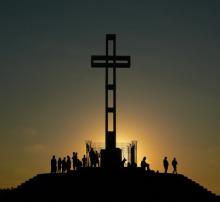
The decades-long battle over a cross erected on public land in California will drag out even longer now that the Supreme Court declined Monday to hear the case.
The conflict in Mount Soledad Memorial Association v. Trunk, is over a 43-foot cross that sits atop Mount Soledad on public land in San Diego. The cross was erected in the 1950s and has since become a veterans’ memorial.
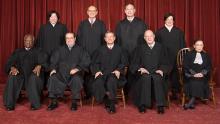
Five things to know about one of the most anticipated Supreme Court decisions of the year:
1. Corporations can’t pray, but they do have religious rights.
Hobby Lobby isn’t a person. It’s a chain of crafts stores owned by a religious family. And though the evangelical Green family objects to parts of the Affordable Care Act’s emergency contraception mandate, it’s not the Greens but the company that writes the check for employees’ health insurance. The first question the justices had to answer was this: Does Hobby Lobby have religious rights? To many Americans, this sounds a little nutty. Does a craft store believe in God?
A majority of the justices held that a closely held company such as Hobby Lobby does have religious rights. The court didn’t apply those rights, however, to publicly held corporations, where owners’ religious beliefs would be hard to discern.
But well before the justices had delivered their verdict on this question, many legal scholars said they wouldn’t be surprised were they to affirm the company’s religious rights. American corporations do have some of the rights and responsibilities we usually associate with people. And in the 2010Citizens United campaign finance case, the justices overturned bans on corporate political spending as a violation of freedom of speech — corporations’ free speech.

The U.S. Supreme Court is expected to finally issue its ruling this week in the highly anticipated case of the craft companies vs. Obamacare.
Technically, it’s Sebelius v. Hobby Lobby and Conestoga Wood Specialties, a showdown over the Affordable Care Act’s contraception coverage mandate. The core legal question is whether a private company can have religious rights.
But to the general public, this is seen as a showdown between employers — the evangelical Green family behind Hobby Lobby and the Mennonite Hahn familythat owns the Conestoga cabinet company — and the employees’ personal reproductive choices under their insurance.
While conservatives have cast the battle as one for religious freedom, the general public may see it as a showdown over personal health choices.

The U.S. Supreme Court on Monday let stand a lower court ruling that a Wisconsin high school acted unconstitutionally when it held its graduation ceremonies in a local megachurch.
As is their custom, the justices did not give a reason for declining to hear a challenge to the 7th Circuit ruling.
Monday’s decision may be a signal by the court that despite its approval of sectarian prayers at public meetings in the Town of Greece v. Galloway decision in May, it draws the line at exposing children to religious symbols when they have not choice about it.